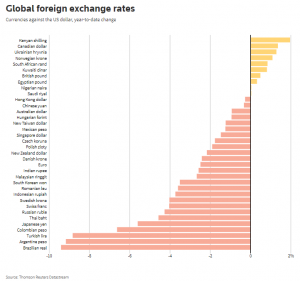Investment bank JPMorgan recommended selling emerging market currencies on Tuesday, completing a 180-degree pivot from the start of the year when it was backing them to have a good run.
After forecasts of a strong run for emerging currencies at the start of the year, many big banks have since turned more bearish as rising U.S. rates, COVID-19 worries and idiosyncratic risks besetting Turkey and Russia weigh on sentiment.
MSCI’s index of emerging market currencies was down around 2% from levels hit two months ago.
“We take another step down in our EM risk allocation, moving EM FX to UW (underweight)” the bank’s analysts said in a research note.
Analysts cited the likelihood of an extended period of underperformance in emerging markets’ growth versus developed markets such as the United States, renewed “idiosyncratic risks in large EMs” as well as rising COVID cases and slower vaccination rollouts in developing economies.
“Having cut CNY (Chinese yuan) and RUB (Russian rouble) overweights last week, and CEE exposure before that, our GBI-EM Model Portfolio is now underweight EM FX,” the bank said.
Last month, Morgan Stanley downgraded its view on emerging market currencies and bonds for the second time in two weeks, predicting EM FX would fall 4%-5%.
Citi said last week a charging U.S. economy and poor yuan asset performance could be a “perfect storm” for EM assets and said it was establishing a neutral stance in the rouble and the South African rand.
The rouble, hammered by fears about tensions with Ukraine, is not far from a five-month low against the dollar, while the Turkish lira has been battered since the country’s central bank governor was replaced last month.
Brazil’s real has slid around 9% against the dollar this year as concerns about politics have surfaced while the country battles one of the world’s highest COVID-19 infection rates.
Such risks were “resulting in ever fewer candidates we would like to be long in EM currencies, against an environment of rising rates where EM growth will be lagging,” JPMorgan said.
Emerging market currencies have had a tough 2021.

Reuters
